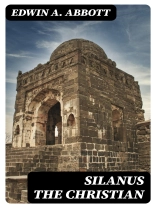In 'Silanus the Christian, ’ Edwin A. Abbott crafts a compelling narrative set against the rich tapestry of early Christian society, weaving a tale that explores themes of faith, morality, and identity. Abbott employs a sophisticated literary style, blending elements of historical fiction with philosophical inquiry, as he delves into the life of Silanus, a Christian martyr navigating the complexities of a pagan world. The book is marked by its intricate character development and thought-provoking dialogue, highlighting the tensions between personal belief and societal expectation in the context of a rapidly changing world. Edwin A. Abbott, an esteemed theologian and scholar of early Christianity, draws on his extensive understanding of the period’s cultural and religious dynamics, as well as his own experiences with faith and philosophy. His background in both literature and theology profoundly informs the narrative, allowing for a nuanced portrayal of Silanus’s struggles and revelations. Abbott’s deep commitment to exploring the interplay of belief and human experience is evident throughout the text, inviting readers to reflect on their own convictions. 'Silanus the Christian’ is an essential read for those interested in early Christian literature, historical fiction, or the philosophical exploration of faith. Abbott’s masterful storytelling and poignant commentary offer not only a gripping journey through ancient challenges but also an enduring message about the power of belief and the quest for understanding in a divisive world.
O autorze
Edwin Abbott Abbott (1838–1926) was an English schoolmaster and theologian, renowned for his scholarly contributions in the late 19th and early 20th centuries. Abbott was born in London and educated at the City of London School and St John’s College, Cambridge. His academic prowess was evident from his numerous prizes and accolades, including the coveted Smith’s Prize for Mathematics. After a distinguished career in academics, he went on to be headmaster of the City of London School, where he implemented innovative educational reforms and emphasized the importance of a broad curriculum. Although Abbott wrote several books on theology, literature, philosophy, and education, he is best known for his literary masterpiece 'Flatland: A Romance of Many Dimensions’ (1884), a satirical novella that explores dimensions and societal hierarchy through the adventures of a two-dimensional square. 'Silanus the Christian’ (1908), another notable work by Abbott, delves into early Christian history, reflecting his profound interest in religious scholarship and the interplay of faith and reason. Abbott’s literary style is characterized by his ability to intertwine complex intellectual discourse with accessible narrative, as demonstrated in his explorations of Christian theology and ethics. A significant figure in Victorian intellectual circles, his contributions to education and literature remain influential to this day, marking him as a polymath with a lasting legacy in the realms of religious thought and speculative fiction.












